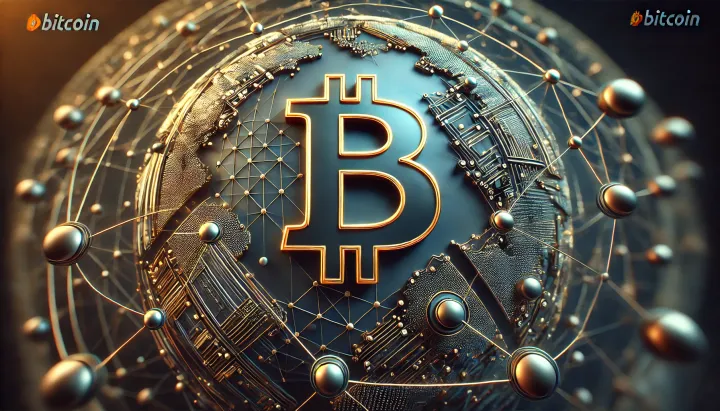How Geopolitical Tensions and Market Shifts Shape Bitcoin's Future
The October 4, 2024 Unchained episode featured André Dragosch, who discusses Bitcoin's price movement following Iran's attack on Israel and its broader implications for Bitcoin’s reputation as a safe-haven asset.

Short Takes
My 'short take' summaries focus on the content of podcast episodes; they do not reflect my own views. If you have comments about this short take note, please leave a comment below (requires signing up for a free blog subscription). Note that some of the podcasts I summarize are likely sponsored episodes: don't trust, verify, if the information you are looking for is to be used for decision-making.
Summary
The October 4, 2024 episode of Unchained, Laura Shin and André Dragosch discuss Bitcoin’s price reaction to the Iran-Israel conflict, highlighting the role of geopolitical events, institutional investment, and evolving market sentiment. The podcast explores Bitcoin’s decreasing volatility over time, its potential to become a safe-haven asset, and the opportunities for investors during periods of uncertainty.
Take-Home Messages
- Geopolitical risk presents buying opportunities: Bitcoin’s short-term sell-offs during geopolitical crises often provide valuable buying windows for long-term investors.
- Bitcoin is stabilizing: Decreasing volatility over time, driven by halving events and institutional involvement, makes Bitcoin more attractive as a stable asset.
- Institutional investors reduce market volatility: With more institutional players entering the market through Bitcoin ETFs, volatility is expected to decrease, creating a more stable investment environment.
- Macroeconomic factors support a bullish outlook: Central bank liquidity injections and favorable monetary policies are contributing to a positive macroeconomic environment for Bitcoin’s future.
- The U.S. election could drive Bitcoin volatility: Political outcomes, such as a Trump victory, may lead to short-term price fluctuations, given market sensitivity to policy changes.
Overview
In the October 4, 2024 episode from Unchained, André Dragosch focuses on how Bitcoin responded to geopolitical tensions following Iran’s attack on Israel. Despite expectations that Bitcoin would behave as a safe-haven asset, the immediate price reaction was a sell-off, while gold saw gains. Dragosch explains that the market sentiment was overly bullish before the event, which created conditions for a pullback. However, he emphasizes that Bitcoin’s historical performance after geopolitical events often leads to recovery, presenting a buying opportunity for those with a long-term outlook.
The conversation also highlights Bitcoin’s decreasing volatility over time. As Bitcoin matures, particularly through successive halving events, its realized volatility has been on a downward trend, bringing it closer to gold’s safe-haven characteristics. This makes Bitcoin increasingly attractive to institutional investors, especially as ETFs introduce new participants to the market.
Finally, macroeconomic factors, including central bank liquidity injections and the upcoming Bitcoin halving, are seen as strong tailwinds for Bitcoin’s future price action. Dragosch remains optimistic that these factors, combined with a reset in market sentiment, will support Bitcoin’s price recovery and continued rally into late 2024.
Broadcast Highlights
- Bitcoin’s initial sell-off following the Iran-Israel conflict: Geopolitical risks caused a short-term price drop for Bitcoin.
- Gold's performance versus Bitcoin: Gold gained value while Bitcoin sold off, revealing the difference in their safe-haven roles.
- Buying opportunity post-sell-off: Historical data suggest that Bitcoin recovers after geopolitical shocks, offering a buying window.
- Volatility trends: Bitcoin’s realized volatility has been decreasing with each halving, indicating a move toward more stable performance.
- Institutional participation: ETFs have introduced institutional investors into Bitcoin markets, helping reduce volatility.
- Central bank policies: Global liquidity injections are key drivers of Bitcoin’s positive price trajectory.
- Illiquid supply: Bitcoin’s liquid supply has reached an all-time low, which may push prices higher.
- Halving event impact: The upcoming Bitcoin halving is expected to create upward pressure on prices due to decreased supply.
- Impact of U.S. elections: The outcome of the 2024 U.S. presidential election, particularly a Trump victory, could significantly affect Bitcoin prices.
- Shift toward safe-haven status: While Bitcoin is not yet fully a safe-haven asset, it is evolving in that direction as its volatility decreases.
Implications
The podcast highlights several implications for Bitcoin’s future. As institutional investors increase their participation, Bitcoin is likely to experience less volatility, making it a more stable asset for long-term portfolios. This could attract more conservative investors who have previously avoided Bitcoin due to its perceived risk. Additionally, the decreasing volatility observed through successive halving events suggests that Bitcoin may eventually establish itself as a safe-haven asset, though it has not yet reached that point.
Geopolitical risks continue to create short-term price fluctuations, but these sell-offs often present valuable buying opportunities for long-term investors. With macroeconomic factors such as central bank policies and liquidity injections aligning positively for Bitcoin, its outlook remains bullish. However, political events, particularly the U.S. presidential election, could lead to temporary volatility.
Future Outlook
As the global macroeconomic environment shifts toward monetary easing and central bank liquidity increases, Bitcoin stands to benefit from these policies. The upcoming Bitcoin halving will further reinforce its scarcity, likely driving prices upward. Investors should be prepared for potential short-term fluctuations due to geopolitical events or political outcomes, such as the U.S. election. However, Bitcoin’s long-term fundamentals, supported by its evolving role as a safe-haven asset and decreasing volatility, position it well for sustained growth.
Broader Implications
Institutional Investment and Market Stability
The rise of institutional investment, particularly through Bitcoin ETFs, will reduce Bitcoin's volatility and stabilize the market, attracting more conservative investors. This trend signals Bitcoin’s maturation and deeper integration into mainstream finance. As regulatory scrutiny increases, Bitcoin may become a core component of institutional portfolios.
Geopolitical Risks and Bitcoin's Role as a Hedge
Bitcoin’s short-term volatility during geopolitical crises challenges its current safe-haven status, though its evolving stability may enhance this role over time. As volatility decreases, Bitcoin could rival gold as a global hedge against uncertainty. More data from future crises will be crucial in refining its risk-hedging potential.
Central Bank Policies and Bitcoin’s Macro Sensitivity
Bitcoin’s sensitivity to central bank liquidity policies positions it as a hedge against fiat currency devaluation. As global liquidity expands, Bitcoin could increasingly serve as an alternative store of value in periods of monetary easing. This macro correlation may drive Bitcoin's adoption in institutional portfolios during economic shocks.
Bitcoin Halving and Long-Term Scarcity
Bitcoin’s deflationary supply model, reinforced by halving events, supports long-term price appreciation due to increased scarcity. Each halving cycle strengthens Bitcoin’s value proposition and its appeal to institutional investors. This scarcity dynamic could accelerate price growth during future bull markets.
U.S. Political Landscape and Regulatory Impact
The outcome of the U.S. presidential election will shape Bitcoin's regulatory future, with potential pro-Bitcoin policies boosting institutional participation. Favorable regulations could drive demand, while harsh regulations might introduce short-term volatility. Bitcoin’s decentralized nature may protect it from significant long-term impacts.



Comments ()